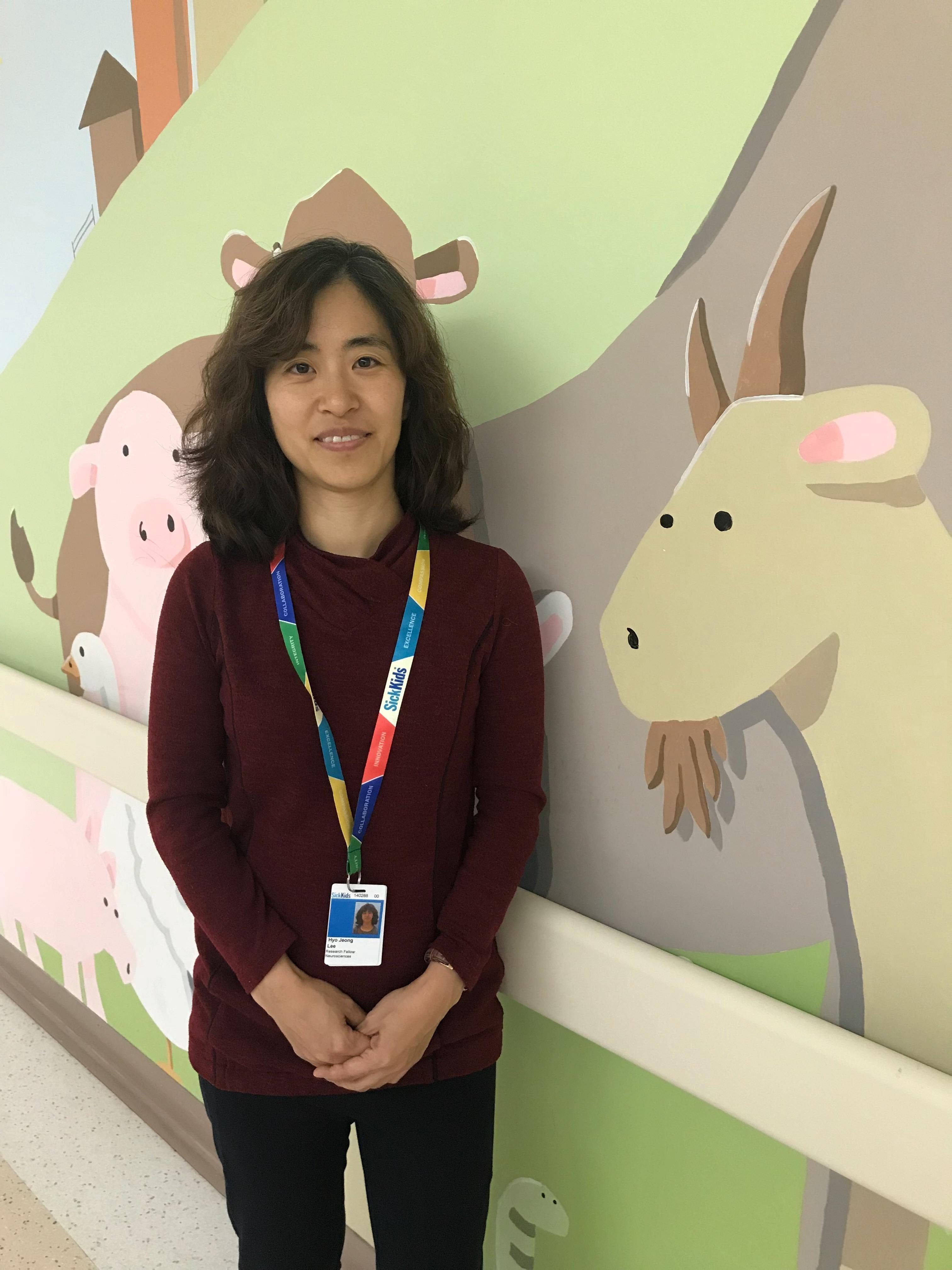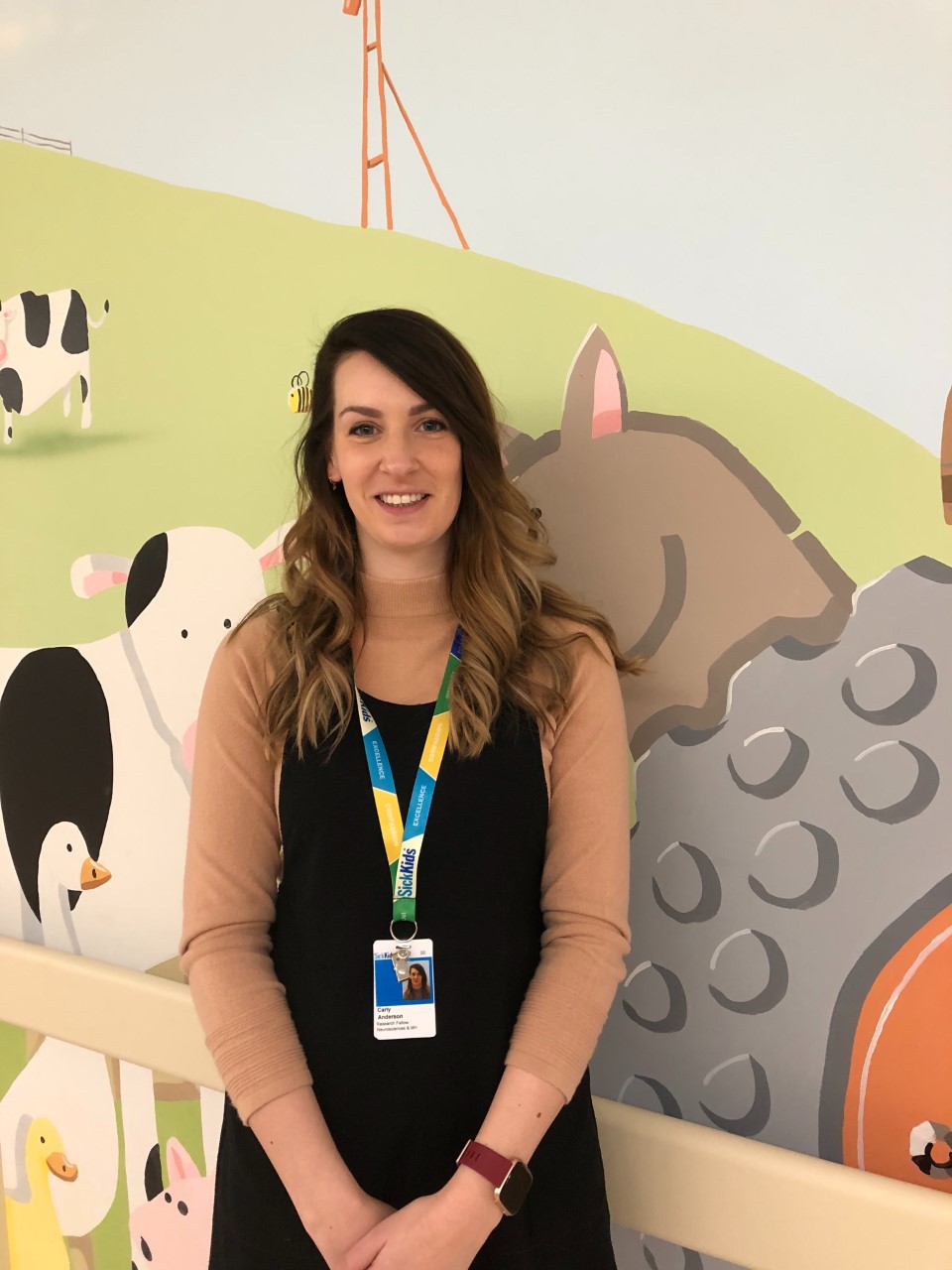 Carly Anderson
Carly Anderson
PhD, BSc
Lab phone: 416-813-6683
Email: carly.anderson@sickkids.ca
Dr. Carly Anderson is a post-doctoral research fellow in the Cochlear Implant Lab. Carly joined the lab in February 2019 when she was awarded the LiUNA! Fellowship for Research Innovation and was selected to receive the Kimel Family Fellow award.. She completed her PhD in Clinical Neuroscience at The University of Nottingham under the supervision of Prof Doug Hartley, Dr Ian Wiggins, and Dr Pádraig Kitterick. Prior to this, she received a BSc in Psychology from The University of Surrey.
Carly’s research focuses on understanding how the brain reorganises during deafness and after cochlear implantation, and how it impacts on a person’s ability to hear with their cochlear implant. Her research has involved using a brain imaging method called fNIRS (functional near-infrared spectroscopy) to understand the interaction between hearing and visual speech (lip reading) in adult CI users. At SickKids, Carly will be working in collaboration with researchers at the Sunnybrook Research Institute and will use EEG and behavioural tests to look at brain reorganisation and audio-visual processing in children using cochlear implants.
Prior to joining SickKids, Carly worked as a Research Programme Manager at the UK charity Action on Hearing Loss. Her grandparents were congenitally deaf, and she continues to improve her British Sign Language skills. Carly is committed to communicating research to the public in an accessible way and ensuring that people with hearing loss are at the centre of her work.
Websites: https://www.researchgate.net/profile/Carly_Anderson7, https://www.linkedin.com/in/carly-anderson-ba7a57167/
Hillary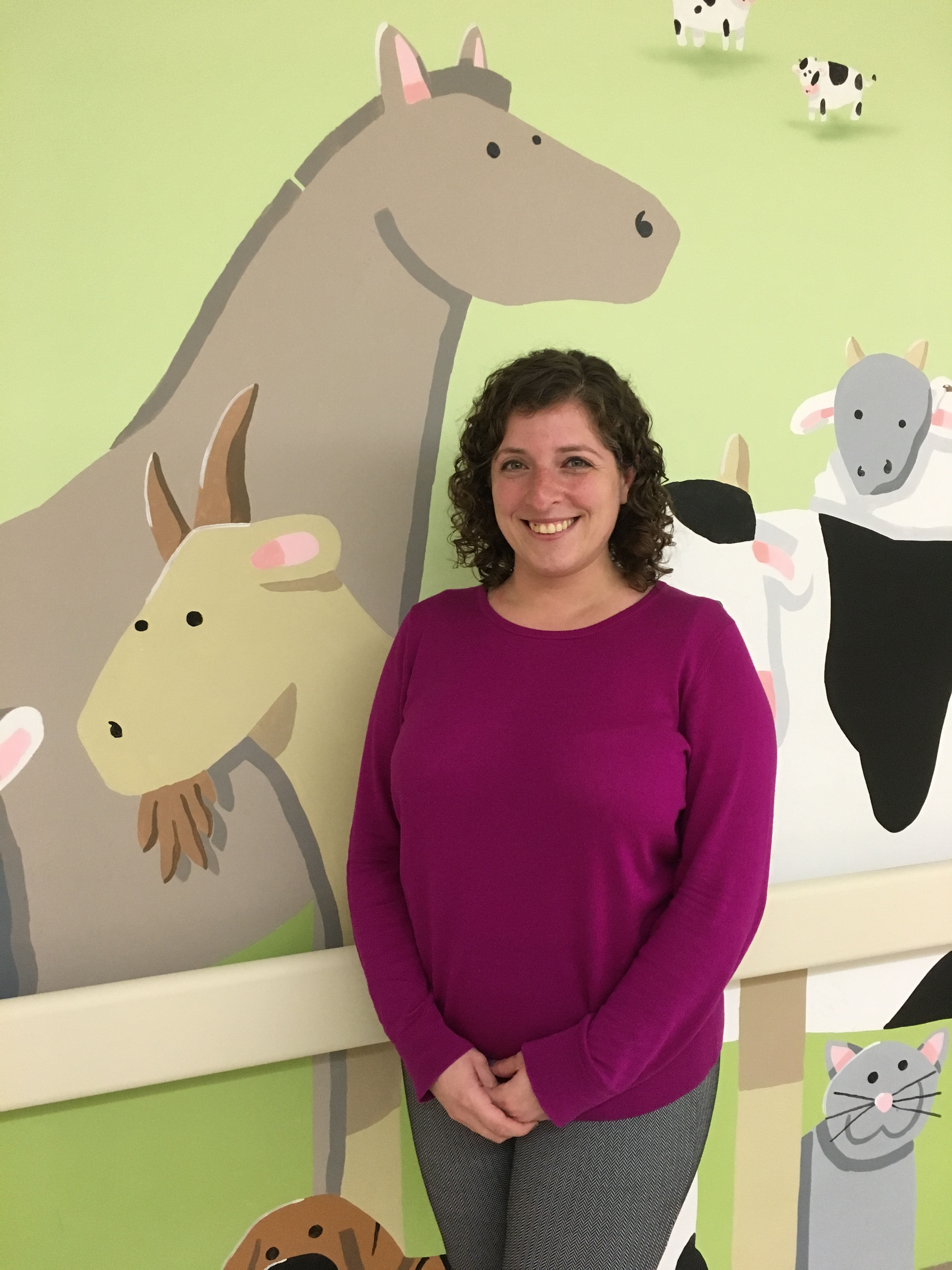 Ganek
Ganek
PhD, CCC-SLP, LSLS Cert. AVT
Lab Phone: 416-813-6683
Email: hillary.ganek@sickkids.ca
Hillary Ganek is a postdoctoral research fellow in the Cochlear Implant Lab. She completed her PhD in rehabilitation sciences at the University of Toronto under the supervision of Dr. Alice Eriks-Brophy. Her research interests include the use of daylong recordings to investigate the natural language and auditory environments of families of children with hearing loss. She believes these methodologies can lead to more individualized intervention strategies.
Prior to beginning her research career, Hillary received a BA in linguistics from McGill University and an MA in speech-language pathology from Northwestern University. She worked clinically as a speech-language pathologist and certified auditory-verbal therapist at the Cora Barclay Centre in Australia and in the cochlear implant clinic at Johns Hopkins. Hillary also volunteers with the Global Foundation for Children with Hearing Loss, training interventionists in Vietnam.
Hyo-Jeong Lee, M.D., Ph.D.
Hyo-Jeong Lee is a visiting scientist in the Cochlear Implant Lab. She had completed her residency training in Seoul National University Hospital and received her Ph.D. in Neuroscience-Otolaryngology at Seoul National University in Seoul, South Korea. From 2003 to 2007, she worked in Paris as a post-doctoral fellow at University of Pierre et Marie Curie under supervision of Dr.Anne-Lise Giraud. Currently, Dr.Lee is an associate professor of Otolaryngology in Hallym University(South Korea) and Director of Laboratory of Brain & Cognitive Sciences for Convergence Medicine. Dr. Lee joined our cortical EEG project in 2018 with the support of Korean National Research Foundation.
Her research interest is in brain plasticity following audio-vestibular sensory loss and recovery. Dr.Lee’s research involved using PET(FDG and O-15 water), fMRI and structural brain imaging. Her previous works have revealed the clinical application of the cross-modal plasticity in deaf CI users and cortical mechanism of vestibular compensation in patients with unilateral vestibular loss.
Hyo-Jeong was awarded the Polizer prize (2011) with a O-15 water PET study about audio-visual processing in CI users. She serves for the Korean Society of Otology and is a member of the Korean Human Brain Mapping Society. She is also a proud mother of two amazing boys.
Publications:
- Ji-Hye Han, Hyo-Jeong Lee (correspondence), Hyejin Kang, Seung-Ha Oh, Dong Soo Lee. Brain Plasticity Can Predict the Cochlear Implant Outcome in Adult-Onset Deafness. Front Hum Neurosci. 2019; 13: 38. Published online 2019 Feb 19. doi: 10.3389/fnhum.2019.00038
- Hyo GeunChoi, GibbeumKim, Byeong Joon Kim, Sung Kwang Hong, Hyung-Jong Kim, Hyo-Jeong Lee. How rare is benign paroxysmal positional vertigo in children? A review of 20 cases and their epidemiology.
- Ji-Hye Han, Dong-Woon Yi, Jihyun Lee, Won-Du Chang, Hyo-Jeong Lee. Development of a Smartphone-Based Digits-in-Noise Test in Korean: a Hearing Screening Tool for Speech Perception in Noise. J Korean Med Sci. 2020 Jun 1; 35(21): e163
- Jihyun Lee, Ji-Hye Han and Hyo-Jeong Lee. Long-Term Musical Training Alters Auditory Cortical Activity to the Frequency Change. Front Hum Neurosci. 21 August 2020
Presentations:
2019
- Do cochlear implants restore bilateral cortical representation in children with single sided deafness? International Hearing Loss Conference, May 2019, Niagara-on-the-lake, Canada
- The importance of consistent cochlear use on cortical plasticity in children with single sided deafness. CIAP 2019, July 2019, Lake Tahoe, CA, USA
Homira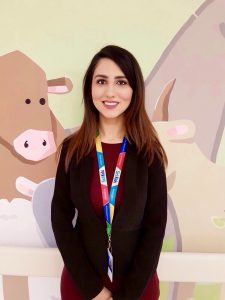 Osman
Osman
PhD, AuD
Homira Osman is a postdoctoral fellow at The Hospital for Sick Children (Neurosciences & Mental Health) and is a part of the Collaborative Program in Neuroscience (University of Toronto). She was recently awarded the SickKids Centre for Brain & Mental Health Integrative Research Fellowship Award for 2017. Homira joined the Cochlear Implant Lab in 2016 after completing her PhD in hearing science at the University of Washington and her clinical fellowship in audiology at Seattle Children’s Hospital Department of Otolaryngology-Head & Neck Surgery & Childhood Communication Centre.
Homira is a clinically-focused researcher with interests in the areas of auditory pathologies, cochlear implants, auditory and visual perception, effortful listening and auditory rehabilitation. In her predoctoral work, she focused on understanding the interplay of auditory and cognitive processes in speech perception. Homira investigated how children decode and process speech under conditions of auditory and cognitive challenge. Her dissertation work emphasized that the ear does not work in isolation from the rest of the brain; higher-order cognitive functions associated with memory, attention, and speed of processing serve an important role in understanding speech. Homira is currently extending on this concept by defining adaptive and maladaptive types of plasticity arising from attention and vision in children with hearing loss and using cortical measures to evaluate cochlear implant and hearing aid device efficacy.
As a clinical audiologist and neuroscientist, Homira is highly interested in knowledge translation in healthcare. She completed the Pacific Science Communication Fellowship in Translational Medicine, TL1 Translational Research Training Program, Leadership Education in Neurodevelopmental & Related Disabilities Fellowship and most recently the Scientist Knowledge Translation Training at the Hospital for Sick Children. Homira hopes to continue her pursuit of translational science by using patient interactions and outcomes to drive her research questions and ultimately improve the quality of life of children and adults with hearing loss.
Homira currently serves on the Canadian Academy of Audiology Scientific Education Committee and American Speech-Language-Hearing Association Convention Program Committee (Intervention/Rehabilitation for Adults with Hearing Loss, Tinnitus, and Balance Disorders).
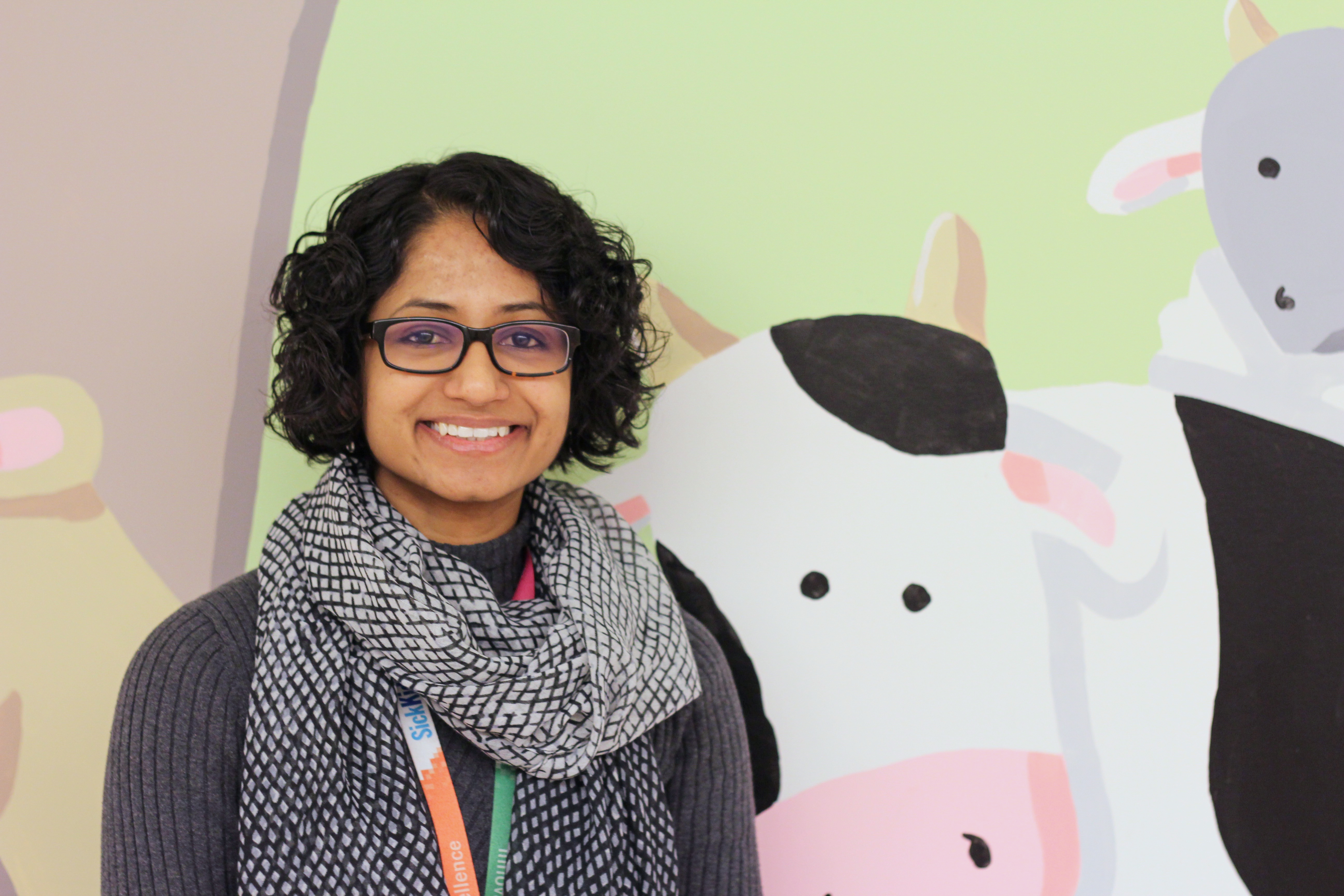 Vijayalakshmi (Viji) Easwar
Vijayalakshmi (Viji) Easwar
B.Sc., M.Sc., PhD, Reg. CASLPO, FAAA
Viji Easwar was a postdoctoral research fellow at The Hospital for Sick Children (Neurosciences & Mental Health) and a part of the Collaborative Program in Neuroscience (University of Toronto) from 2014-2016. She joined the Cochlear Implant lab in 2014 after completing her PhD in hearing science at the National Centre for Audiology at the University of Western Ontario in London Ontario, under the supervision of Dr. Susan Scollie and Dr. David Purcell.
In her PhD work, she investigated the use of auditory evoked potentials as an objective outcome measure in hearing aid users, mainly intended for use in infants with hearing loss. Her work focused on speech-evoked envelope following responses, cortical auditory evoked potentials, and hearing aid signal processing interactions with stimuli used for auditory electrophysiology.
Prior to her PhD, Viji worked as a paediatric audiologist in the Royal Hospital for Sick Children, Glasgow, UK and as an audiologist at the Royal Sussex County Hospital, Brighton, UK. Viji obtained her M.Sc. (clinical and thesis) in Audiology from the Institute of Sound and Vibration Research at the University of Southampton, Southampton, England, UK and her B.Sc. from the All India Institute of Speech and Hearing, Mysore, India. Viji serves as the Director of Research of Audiology India, a non-profit, non-government organization that aims to improve hearing health care in India, and is a member of the Science and Education committee of the Canadian Academy of Audiology.
Viji’s interests include outcome measures in children with hearing loss and the use of auditory electrophysiology as a diagnostic and outcome measure in children with hearing loss, who wear hearing aids or use cochlear implants. Her current work is in the area of binaural hearing and its electrophysiological correlates in children with bilateral cochlear implants.
Awards and Funding:
2014-2016
- Postdoctoral fellowship program/ Research Training Competition (RESTRACOMP)
2016
- Ear and Hearing editor’s award for outstanding research article in 2015
- Student travel award, Association for Research in Otolaryngology 2016
2015
- Endorsed as Western University’s candidate for the Proquest Distinguished Doctoral Dissertation award in Biology and Life Sciences category.
- Travel award, Society for Ear, Nose, & Throat Advances in Children (SENTAC) 2015
- Travel award, Conference on Implantable Auditory Prosthesis (CIAP) 2015
2014
- Student Award Winner, 8th International Symposium on Objective measures in Auditory Implants, Toronto, Canada
- NIDCD Travel award, Academy Research Conference, AudiologyNow! 2014
- Student Research Award (top five of 40 projects), American Academy of Audiology, AudiologyNow!
- Public Service Alliance of Canada Local 610 Academic Achievement Scholarship
- Faculty of Health Sciences Award, The University of Western Ontario
- Health and Rehabilitation Sciences Travel award, The University of Western Ontario
2013
- Nominated for Graduate Student Teaching award 2013
- Graduate Thesis Research Fund, The University of Western Ontario
2012
- Faculty of Health Sciences Award, Western University
- Health and Rehabilitation Sciences Travel award, Western University
2008
- P.E. Doak best student award of the year in M.Sc. Audiology in Institute of Sound and Vibration Research, University of Southampton, UK
Publications
- Easwar V, Purcell DW, Aiken SJ, Parsa V, Scollie SD. (2015). Evaluation of speech-evoked envelope following responses as an objective aided outcome measure: effect of stimulus level, bandwidth, and amplification in adults with hearing loss. Ear and Hearing, 36(6), 635-652. Paper won the 2015 Ear and Hearing Editors.
Award for outstanding contribution to literature on hearing and balance. - Easwar V, Purcell DW, Aiken SJ, Parsa V, Scollie SD. (2015). Effect of stimulus level and bandwidth on speech-evoked envelope following responses in adults with normal hearing. Ear and Hearing, 36(6), 619-634.
- Easwar V, Beamish L, Aiken S, Choi JM, Scollie S, and Purcell D. (2015) Sensitivity of speech evoked envelope following responses to vowel polarity. Hearing Research, 320, 38-50.
- Glista D, Scollie S, Moodie S, and Easwar V. The network of pediatric audiologists in Canada. (2014) The Ling 6(HL) Test: Typical pediatric performance data and clinical use evaluation. Journal of American Academy of Audiology, 25(10), 1008-1021.
- Easwar V, Boothalingam S, Chundu S, Manchaiah VK, and Ismail S. (2013). Audiological practice in India: an internet-based survey of audiologists. Indian Journal of Otolaryngology and Head & Neck Surgery, 65(S3), S636-S644.
- Glista D, Easwar V, Purcell D, and Scollie S. (2012). A pilot study on cortical auditory evoked potentials in children: aided CAEPs reflect improved high-frequency audibility with frequency compression hearing aid technology. International Journal of Otolaryngology, Special Issue Hearing aids and the Brain, 2012.
- Easwar V, Purcell D, and Scollie S. (2012). Electroacoustic comparison of hearing aid output of phonemes in running speech versus isolation: implications for aided cortical auditory evoked potentials testing. International Journal of Otolaryngology, Special Issue Hearing aids and the Brain, 2012.
- Easwar V, Glista D, Purcell D, and Scollie S. (2012). Hearing aid processing changes tone burst onset: effect on cortical auditory evoked potentials in individuals with normal audiometric thresholds. American Journal of Audiology, 21(1), 82-90.
- Easwar V, Glista, D, Purcell D, and Scollie S. (2012). The effect of stimulus choice on cortical auditory evoked potentials (CAEP): Consideration of speech segment positioning within naturally produced speech. International Journal of Audiology, 51(12), 926-931.
Technical Reports:
- Scollie S, Bagatto M, Moodie S, Seewald R, Hyde M, Weber S, Martin V, Glista D, Tharpe AM, Crukley J, Easwar V, Hawkins M, Levy C, Zimmo S, Moodie S, Richert F, and Parsa V. (2014) Protocol for the provision of amplification. Ontario Infant Hearing Program.
- Easwar V. (2012) Incorporating problem-based learning in Audiology curricula: sowing seeds for problem solving & self-directed learning. Capstone Project, Teaching Support Center, The University of Western Ontario.
- Scollie S, Easwar V, and Bagatto M. (2012) Evaluation of the intelligent hearing systems Baby Isao simulated patient. Technical report for the Ontario Infant Hearing Program for use of Baby Isao as a training tool for Audiologists.
Presentations:
- Easwar V. (2016, Sep) Objective outcome measures of hearing aid fittings. 33rd World Congress of Audiology – Vancouver, Canada (Invited).
- Easwar V. (2016, May) Using envelope following responses as a hearing aid outcome measure. Frequency Following Workshop – Boston University, Boston, USA. (Invited).
- Easwar V, Deighton M, Yamazaki H, Polonenko M, Papsin B, Gordon K. (2016, Feb) Cortical representation of bilaterally presented sounds in children with two cochlear implants. Poster to be presented at the 2016 Association for Research in Otolaryngology MidWinter Meeting, San Diego, USA.
- Easwar V, SanfilippoJ, Papsin B, Gordon K. (2015, Dec) Cochlear implant datalogging reveals the practical challenges of CI use in children: the frequent coil-off. Podium presentation – Society for Ear, Nose, & Throat Advances in Children, San Antonio, USA.
- Easwar V, Deighton M, Abbasalipour P, Papsin B, Gordon K. (2015, Jul) Cortical detection of interaural timing and level cues in children with bilateral cochlear implants. Poster presented at the Conference on Implantable Auditory Prosthesis, Lake Tahoe, USA.
- Easwar V, Deighton M, Papsin B, Gordon K. (2015, May) Cortical processing of bilateral stimuli in children with bilateral cochlear implants and normal hearing. Podium presentation – 24th Annual Percy Ireland Day, University of Toronto, Toronto, Canada
- Easwar V, Purcell D, Aiken S, and Scollie S. (2014, Oct) Evaluation of envelope following responses as an objective hearing aid outcome measure. Poster presented at the 8th International Symposium on Objective Measures in Auditory Implants, Toronto, Canada.
- Easwar V, Beamish L, Aiken S, Scollie S, amd Purcell D. (2014, May) Sensitivity of envelope following responses to vowel polarity. Poster presented at the Frequency Following Response workshop, University College, London, England.
- Easwar V, Purcell D, Aiken S, and Scollie S. (2014, Mar) Use of speech-evoked envelope following responses as a hearing aid outcome measure. Podium presentation at the Student Research Forum, American Academy of Audiology AudiologyNow!, Orlando, USA.
- Easwar V, Purcell D, Aiken S, and Scollie S. (2014, Mar) Sensitivity of speech-evoked envelope following responses to level, bandwidth, and amplification. Poster presented at the Academy Research Conference (Hearing aids and the Brain), American Academy of Audiology AudiologyNow!, Orlando, USA.
- Easwar V, Purcell D, Aiken S, and Scollie S. (2014, Feb) Sensitivity of speech-evoked envelope following responses to level and amplification in normal hearing and hearing impaired adults. Poster presented at the Association for Research in Otolaryngology conference, San Diego, USA.
- Easwar V, Purcell D, Aiken S, Choi J, and Scollie, S. (2013, Jun). Envelope following responses (EFRs) using modified speech stimuli for hearing aid evaluation. Poster presented at the International Evoked Response Audiometry Study Group, New Orleans, USA.
- Easwar V, Purcell D, and Scollie S. (2012, Aug). Exploration of hearing aid gain characteristics during aided cortical auditory evoked potentials testing. Poster presented at the International Hearing Aid Research Conference, Lake Tahoe, USA.
- Easwar V, Khurana T, and Vanaja CS. (2006, Jan) Objective estimation of loudness discomfort level using auditory brainstem response. Poster presented at the Indian Speech and Hearing Conference, Ahmedabad, India.
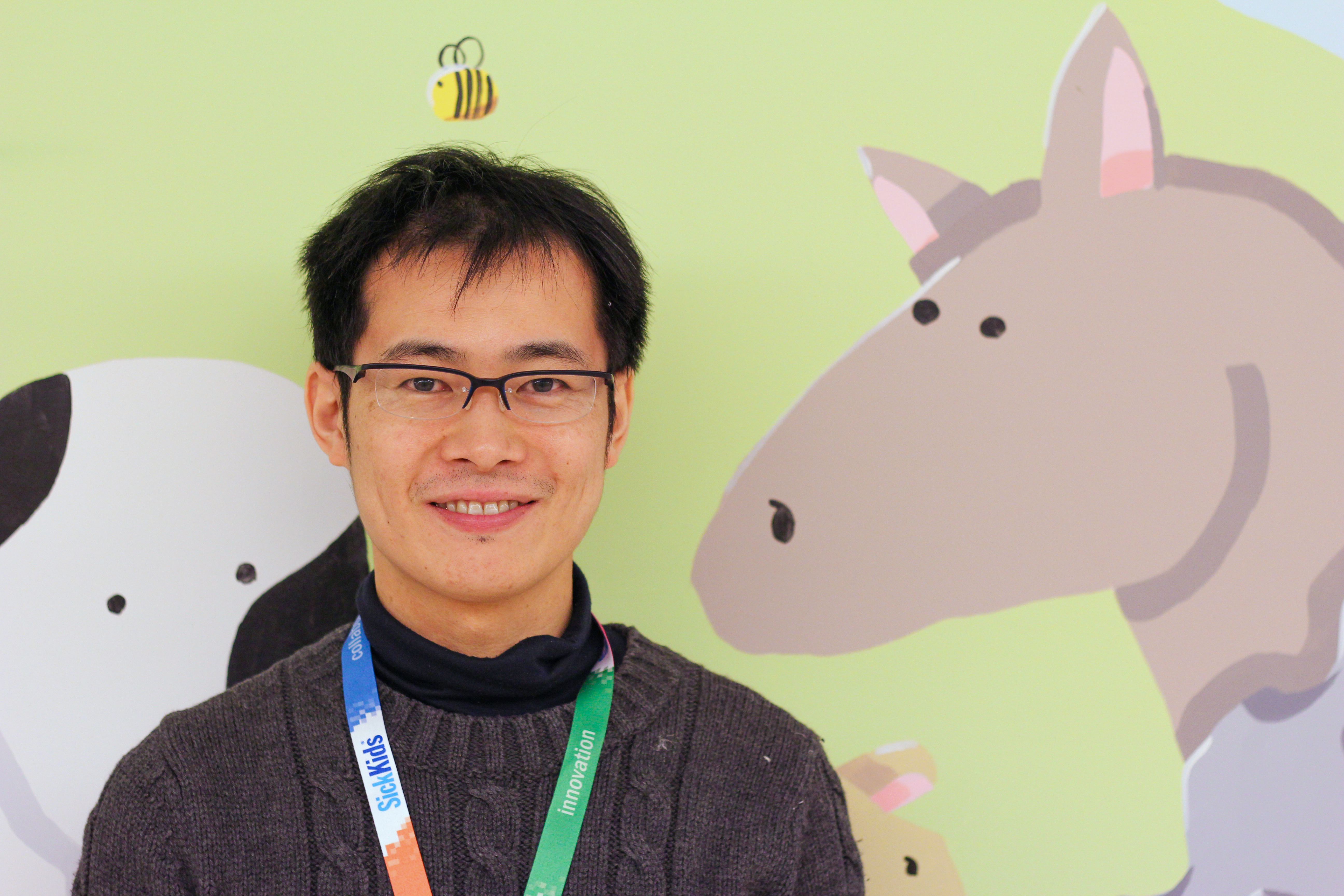 Hiroshi Yamazaki
Hiroshi Yamazaki
MD, PhD
Hiroshi Yamazaki graduated from Kyoto University (MD-PhD course) in 2006. After completing Otolaryngology Head and Neck surgery training at Kobe City Medical Center General Hospital in 2011, he worked as an otologist at Kobe City Medical Center General Hospital and Kyoto University in Japan. In his clinical work, he focused on cochlear implantation in deaf children and investigated patients with conditions such as congenital cytomegalovirus infection, inner ear malformations, and cochlear implant device failure, which affects cochlear implant outcomes. He believes that appropriate management of these conditions are essential to maximize hearing outcomes and language development in deaf children. He is interested in objective measurements of brain development and maturation after cochlear implantation. Hiroshi joined Archie’s Cochlear Implant Lab from 2015 to 2016.
Selected Publications:
- Yamazaki H, Jaime L, Briggs R, Naito Y. Usefulness of MRI and EABR testing for predicting CI outcomes immediately after cochlear implantation in cases with cochlear nerve deficiency. Otol Neurotol. 2015 Otol Neurotol. 2015 Jan 28. [Epub ahead of print]
- Yamazaki H, Naito Y, Fujiwara K, Moroto S, Yamamoto R, Yamazaki T, Sasaki I. EABR-based evaluation of the spatial distribution of auditory neuronal tissue in common cavity deformities. Otol Neurotol. 2014; 35:1394-402
- Yamazaki H, O’Leary S, Moran M, Briggs, R. Comprehensive analysis of cochlear implant failure: usefulness of clinical symptom-based algorithm combined with in situ integrity testing. Otol Neurotol. 2014; 35:605-612.
- Yamazaki H, Naito Y, Moroto S, Tamaya R, Yamazaki T, Fujiwara K, Ito J. SLC26A4 p.Thr410Met homozygous mutation in a patient with a cystic cochlea and an enlarged vestibular aqueduct showing characteristic features of incomplete partition type I and II. Int J Pediatr Otorhinolaryngol. 2014;78(12):2322-2326
- Kishimoto I, Yamazaki H (equally contributed 1st author), Naito Y, Shinohara S, Fujiwara K, Kikuchi M, Kanazawa Y, Tona R, Harada H. Clinical features of rapidly progressive bilateral sensorineural hearing loss. Acta Otolaryngol. 2014 Jan;134(1):58-65.
- Yamazaki H, Yamamoto R, Moroto S, Yamazaki T, Fujiwara K, Nakai M, Ito J, Naito Y. Cochlear implantation in children with congenital cytomegalovirus infection accompanied by psycho-neurological disorders. Acta Otolaryngol. 2012 Apr;132(4):420-7.
- Yamazaki H, Sekiguchi M, Takamatsu M, Tanabe Y, Nakanishi S. Distinct ontogenic and regional expressions of newly identified Cajal-Retzius cell-specific genes during neocorticogenesis. Proc Natl Acad Sci U S A. 2004 Oct 5;101(40):14509-14.
Dr. Talar Hopyan
- Hopyan T, Peretz I, Chan LP, Papsin BC, Gordon KA. (2012) Children using cochlear implants capitalize on acoustical hearing for music perception. Front Psychol. 2012;3:425. doi: 10.3389/fpsyg.2012.00425. Epub 2012 Oct 22.
- Hopyan T, Gordon KA, Papsin BC. (2011) Identifying emotions in music through electrical hearing in deaf children using cochlear implants. Cochlear Implants International, 12(1):21-6.
- Hopyan T, Gordon KA, Papsin BC, MacDonald L. Children with hearing loss learn to enjoy singing through vocal training. Oral presentation: 10th European Symposium on Paediatric Cochlear Implantation, May 12-15, Athens, Greece. E017 in International Journal of Pediatric Otorhinolaryngology, 75: 64.
- Hopyan T, Gordon KA, Dennis M, Papsin BC. (2009). Recognition of Affective Speech Prosody and Faces in Deaf Children with Cochlear Implants. Child Neuropsychology, 15, 136-146.
Conferences, Presentations and Symposiums:
- 2011 – Hopyan T, Gordon KA, Papsin BC, What are children using cochlear implants hearing in music? Oral presentation for 13th Symposium on Cochlear Implants in Children, Chicago, IL, July 14-16.
- 2011 – Hopyan T, Gordon KA, Papsin BC, Adolescents with hearing loss benefit from vocal training, poster presentation for 13th Symposium on Cochlear Implants in Children, Chicago, IL, July 14-16.
- 2011 – Hopyan T, Gordon KA, Papsin BC, MacDonald L. Children with hearing loss learn to enjoy singing through vocal training. Oral presentation: 10th European Symposium on Paediatric Cochlear Implantation, May 12-15, Athens, Greece. E017 in International Journal of Pediatric Otorhinolaryngology, 75: 64.
- 2010 – Hopyan T, Papsin BC, Gordon KA, Multi-Sensory Information Enhances Speech Perception in Children using Cochlear Implants, Oral presentation, 11th International Conference on Cochlear Implants and Other Implantable Auditory Technologies, June 30 – July 3, 2010, Stockholm, Sweden.
- 2009 – Hopyan T, Papsin BC, Gordon KA, Music Appreciation in Children with Cochlear Implants, 12th International Conference on Cochlear Implants in Children, Seattle, WA, June 18-20, 2009.
- 2007 – Hopyan-Misakyan TM, Gordon KA, Dennis M, Papsin BC. Identification of emotion in music in children with early onset deafness who use cochlear implants, International Workshop on the Biology and Genetics of Music, Bologna, Italy, May 20-22, 2007.
Awards:
- 2010 – Talar Hopyan, Andrew Sass-Kortsak Fellowship Award, (for outstanding work as a Post-doctoral Fellow), The Hospital for Sick Children
- 2009 – Talar Hopyan, Blue Ribbon Award, Divison 40, Neuropsychology American Psychological Association
- 2009 – Talar Hopyan, Post-doctoral Fellowship Award, SickKids Research Institute

